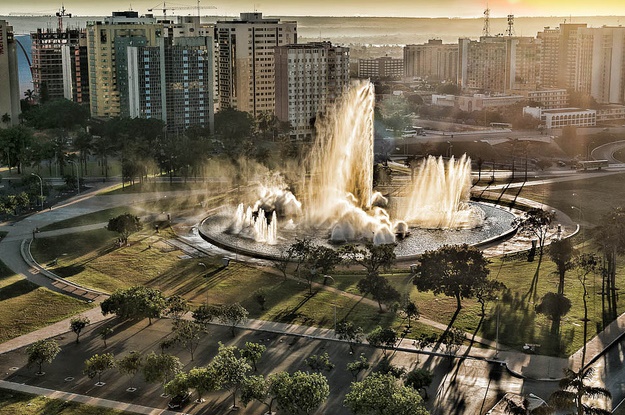Brazil’s current political crisis began at a gas station in Brasília. When federal police raided a currency exchange booth in the station on March 17, 2014, they stumbled upon a network of political corruption that has cost state oil giant Petrobras at least $2 billion. Since then, more than 50 politicians have come under federal investigation, more than a dozen businesspeople have been arrested, and hundreds of thousands of protesters have taken to the streets, banging pots and pans and calling for President Dilma Rousseff’s resignation.
The unfolding scandals have left a cloud of uncertainty over Brasília. But there is a positive side. The Petrobras scandal has sparked a wave of anticorruption measures that could transform relationships between the state and corporations— and reshape Brazil’s electoral politics. Parties now talk about ending private financing for campaigns— Brazil’s main gateway for political corruption. Discussions of even more serious reforms now dominate domestic politics, though so far the only measure the legislature and the executive branch have agreed on was to dramatically increase public funding for campaigns— from US$ 100 million in 2014 to US$ 300 million this year.
The investigation is dubbed Operation Lava Jato (Car Wash), in a reference to the hugely popular U.S. TV series Breaking Bad. Echoing some of the series’ plot points, the Brasília gas station turned out to be a front for a lucrative black-market operation that implicated some of Brazil’s senior politicians and corporate chiefs. The gas station’s owner, Carlos Habib Chater, led investigators to black-market money dealer Alberto Youssef, who testifi ed that he had helped launder funds in the bribery scheme, and led in turn to the arrests of Paulo Roberto Costa, Petrobras’ former director, and several executives from Brazil’s multinational construction fi rms. Investigators went on to uncover links between Petrobras and key members of the ruling Partido dos Trabalhadores (Workers’ Party—PT) coalition. Some opposition party leaders, including the late Sérgio Guerra, a former chairman of the Partido da Social Democracia Brasileira (Party of Brazilian Social Democracy—PSDB), have also been implicated—allegedly to stop congressional inquiries into the scheme.
According to investigators, the scheme laid bare the corrupt ties between the country’s corporate and political elite. Construction firms paid bribes to Petrobras directors to win overpriced contracts with the state-run oil firm. A chunk of those bribes was then sent to Youssef, who laundered that money into politicians’ coffers. One of the men in jail accused of those crimes is João Vaccari Neto, former PT treasurer and a key fundraiser in Rousseff’s campaign. Documents show that the arrangements began as early as 2000 and the scheme survived until 2012. Presidents Fernando Henrique Cardoso, Luiz Inácio Lula da Silva and Dilma Rousseff denied any prior knowledge of the misdeeds.
It’s noteworthy that Rousseff came into offi ce in 2011 vowing to crack down on corruption. She dismissed six ministers during her first year over allegations of graft and influence peddling. In 2012, Costa resigned from his post at Petrobras, signing a plea bargain and providing testimony and troves of documents to the justice department.
Rousseff, who chaired the board of Petrobras from 2003 to 2010, has not been directly linked to the scandal, but faces political pressure to concede more power to some of the very officials investigated by Lava Jato—primarily to the speaker of the house, Eduardo Cunha. In February 2015, Rousseff fired Petrobras’ president, Maria das Graças Foster. Then Rousseff replaced political appointees on Petrobras’ board. In December, she published a list of 23 companies, including Brazil’s largest construction firms, implicated in Lava Jato, that would no longer be allowed to bid for Petrobras contracts. More recently she modifi ed Brazil’s anticorruption law to determine whether leniency deals can be struck. None of that made her more popular: a June Datafolha poll gives her a 10 percent approval rating. She is heavily maligned in congress, even by some fellow PT members.
The Petrobras scandal has triggered deep changes in the judiciary, inaugurating an era of unprecedented plea bargains in Brazil. However, no one knows for how long prosecutors will be so liberal in handing out such bargains, as some magistrates have already noted the excesses. Federal Judge Sérgio Moro, who has led investigations, is accused of using preventive arrests to lead executives into such deals. But he has gathered a vast body of evidence in the case.
Attorney General Rodrigo Janot is using information from Moro to recommend further investigations of 54 people, including many highranking politicians. The supreme court is to decide which cases and what evidence will be accepted.
The PT pledged not to accept private money in the upcoming 2016 mayoral elections and to kick out any members found guilty in the probe. This marks a dramatically different approach from the 2005 mensalão scandal—a vote-buying incident in which members of congress received monthly payments for supporting PT-backed legislation. However, many doubt that if high-ranking PT members are implicated in the scandal, PT will keep its word. Other parties with deep implications in the scheme have largely remained silent. The Partido do Movimento Democrático Brasileiro (Brazilian Democratic Movement Party—PMDB), once Rousseff’s biggest ally and now her biggest enemy, plans on using the scandal to extract concessions from the president in congress. Less ideological parties are expected to follow suit.
Meanwhile, Petrobras is slowly recovering. In May, the company posted $1.78 billion in first-quarter profits, beating expectations. However, its value has fallen from US $86.8 billion in market value last year to US $44.4 billion in 2015. Once ranked 30th on Forbes’ Global 2000 list, it dropped to 416th in 2015.
The countdown for mayoral elections has begun. But for the first time since the end of the dictatorship (1964–1985), Brazilian politics are very hard to predict. The only sure thing is that the corruption scandal is far from over and that the pot-banging won’t stop any time soon.





